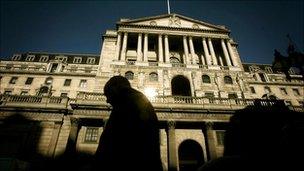Bank of England minutes show two members wanted more QE
- Published

No-one on the Bank of England's MPC thought there should be any change in interest rates.
Two members of the Bank of England's Monetary Policy Committee (MPC) wanted more money pumped into the economy than the £50bn that was agreed earlier this month, meeting notes reveal.
The two voted for a £75bn stimulus to the economy, external in February, but the other seven disagreed.
The majority considered that £50bn would be enough, with some saying no further action was needed.
The news sent sterling down against most major currencies.
Against the euro, the pound fell to a two-month low of 1.1822 euros, while against the dollar, it dropped more than a cent to $1.5666.
"The minutes have made more QE [quantitative easing] more likely than the market had anticipated, and it came as a surprise, which is why there's been a fairly big move in sterling," said Geraldine Concagh, economist at AIB Group Treasury in Dublin.
Since the credit crisis began, the Bank has pumped £275bn into the economy through quantitative easing. This means the Bank buying assets - largely government bonds - from commercial banks.
It topped up that amount to £325bn at its meeting two weeks ago.
MPC committee member David Miles joined Adam Posen in voting for a £75bn boost.
Mr Posen has long argued for greater stimulus and until recently, thought another cut in interest rates was a good idea.
This time, no-one thought there should be any change in interest rates from 0.5%. UK rates have been at that level - a record low - since March 2009.
Inflation
Mr Posen and Mr Miles said there was a risk of a prolonged period of depressed demand, which could cause inflation to fall below its 2% target in the medium term.
Last week, the Bank said inflation would be only just below target in two years, at around 1.8%.
Mr Posen and Mr Miles also said more QE now would reduce the risk of rising unemployment and downscaling by firms.
While they are worried the economy remains fragile enough to merit another dose of QE, recent economic data has been less bad than expected.
Government finance figures published on Tuesday showed it was on target to meet or even undershoot its borrowing target for this year, while retail sales figures last week showed better growth than was expected.
However, the latest unemployment figures showed joblessness continuing to climb and the Bank of England itself has said the economy will "zigzag" between positive and negative growth this
Alan Clarke at Scotiabank said that he had expected the minutes to close the door on further QE, but that in fact they left open the possibility for more: "We doubt the Bank will deliver more QE, but the minutes mean it is less clear-cut."